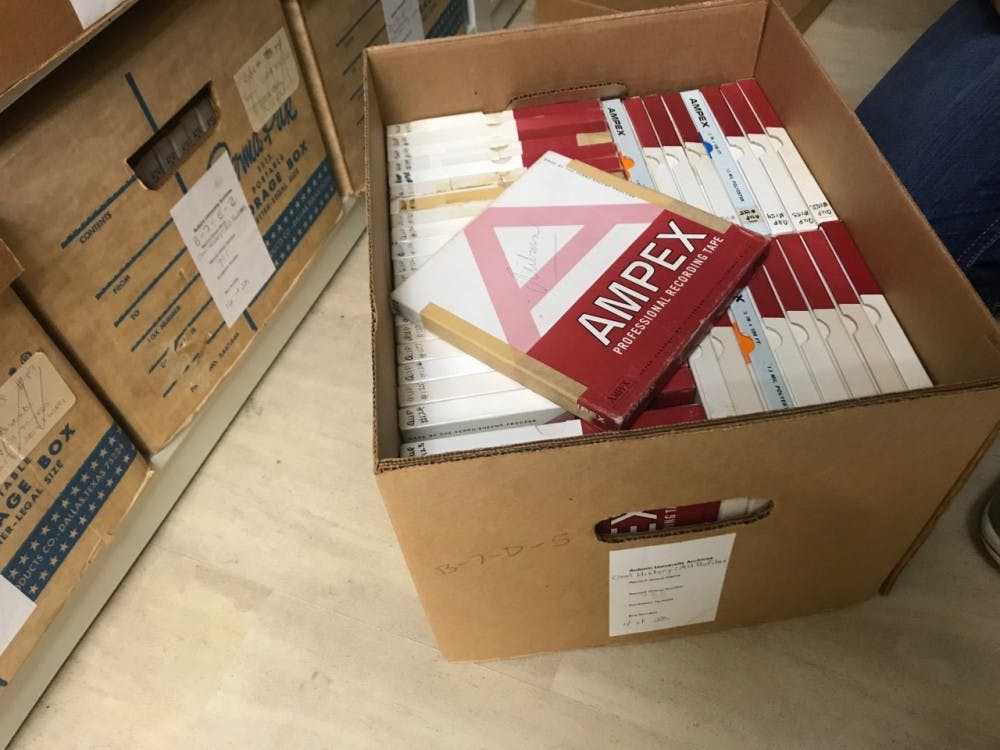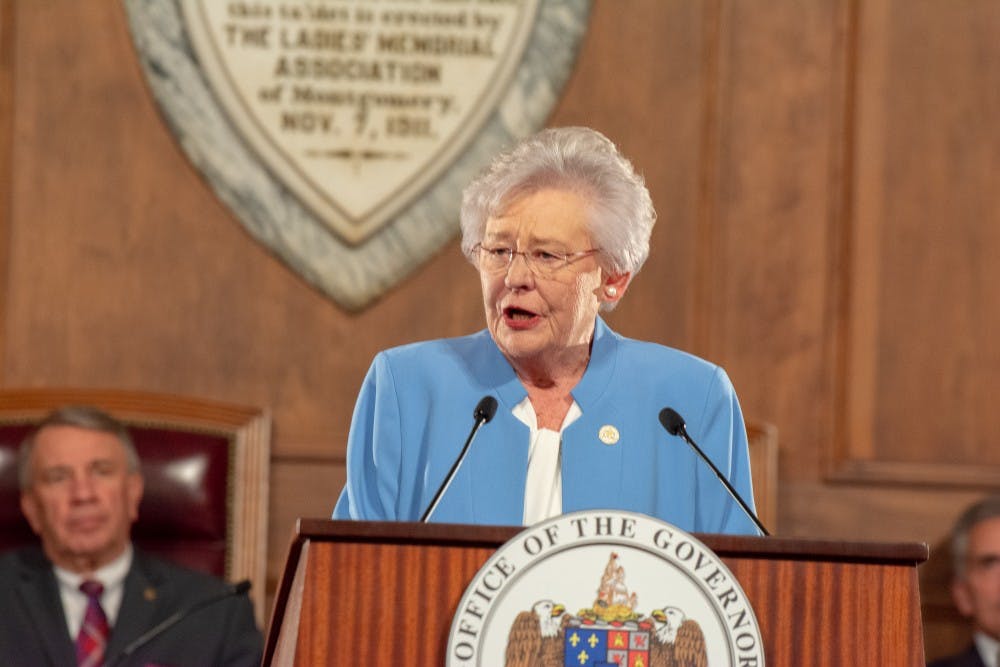Before Gov. Kay Ivey acknowledged she wore blackface — while maintaining that she did not recall the racist skit of her doing so — Auburn University Libraries Special Collections and Archives Department was going through tape reels from the ‘60s, digitizing their contents, when they stumbled upon one with the label: “Student Reflections on BSU Night Kay Ivey, Ben LaRavia.”
In the audio from 1967 was the voice of Ivey’s then-fiance, Ben LaRavia, saying on “AU Profiles” — a University radio show — that in a skit at a Baptist Student Union party, Ivey was wearing blue “cover-alls” and “black paint all over her face,” as she crawled on the floor looking for cigar butts.
Greg Schmidt, a special collections librarian at Auburn, was listening to the audio on April 17, 2019 — likely the second person to have heard it in more than 50 years, behind only his archives student worker, Ella Sykes, who was the first to hear it as she processed the audio.
“You hear something like that, and you realize it’s going to make a wave,” Schmidt said.
The initiative to process these tapes stems from Tiger Giving Day when special collections and archives requested donors give money to obtain a reel-to-reel tape player and appropriate digitizing equipment. The project was fully funded.
It was a whole process before they could even listen to the tapes, he said. The digitizing system begins with boxes and boxes of reel-to-reel tapes stored in tidy red packages. The tapes are loaded on a device called an Otari, which records and then transfers the contents of the tapes to Audacity, an audio editing and recording application software.

On top of the cardboard box is the the reel-to-reel tape of Ivey acknowledging she was in blackface.
Once it’s on file, this is when Schmidt can listen to and edit the audio. The next step involves uploading the file to the archives website — a process he says can take months because of the amount of files that are backlogged. The Ivey file was No. 237. There are probably 500 to 800 more, he said.
Sykes, who was a history major at Auburn before graduating last May, walked in to work on April 17 to do what she had since August: chip away at that stack of 500 to 800 reel-to-reels for four hours.
She reached for tape No. 237 and plopped it on the Otari.
“It was all fairly normal, and then all of a sudden [LaRavia] said the thing about [Ivey] wearing black paint all over her face,” she said. “And I just sort of hit the pause button because that came out of nowhere.”
She sat in her chair for a minute, headphones still on, and tried to process what she had just listened to.
“It was just wild,” she said. “It’s not what you expect to find.”
Sykes didn’t really know how to tell Schmidt about what she had just heard.
She sent Schmidt an email that said the following:
“Hey Greg, I found three more interviews with Kay Ivey. I’ve attached them to the email. Heads up, the third interview is about BSU skit night, and they talk about Kay wearing blackface.”
Schmidt said hearing the audio “was depressing, but not shocking.” The file was added to a list that was becoming more and more backlogged, slowing the time in which the file could be posted online, he said. He told his higher up, Aaron Trehub, assistant dean for technology and head of special collections and archives, about the audio.
The director of communications and marketing for Auburn University Libraries, Jason Hill, said that on Aug. 26, special collections and archives expected the audio file to be posted on Aug. 30. Hill said Trehaub notified the dean’s office on Aug. 26 in the late afternoon, and from there news about the tape traveled to the University’s Office of Communication and Marketing on Tuesday morning. OCM then referred special collections and archives to Governmental Affairs.
The Montgomery Advertiser reported that Ivey’s office found out about the tapes on Aug. 27 — two days before the story broke — and Ivey heard it for the first time the following morning.
Schmidt said he was wary about picking the file out from the backlogged line and posting it on the website.
“We try to follow a process,” Schmidt said. “Had I immediately called The Plainsman … I felt it would be unfair or not necessarily unfair, but it would open the libraries up to criticism of being political.”
The Ivey file stayed in a limbo of being on file but not posted online from April to the end of August. Schmidt said it wasn’t posted until last week because everyone left for the summer, and the digitizing process slowed down. In August, after everyone got back in academic gear, the digitizing of files renewed.
Auburn University’s Executive Director of Public Affairs Brian Keeter sent the following statement to The Plainsman:
“We understand the interview with the governor was converted into digital format toward the end of the spring semester. Leadership in central administration was notified last week when the materials were being prepared for posting online.”
Schmidt said the whole process was interesting to navigate because it’s a librarian’s job to “make stuff available” and “give these things access.”
“That’s a question of should we rush this forward, or should we just continue with the process,” he said. “We don’t want to come across as aiding in a hit-piece by rushing it forward. We just kind of continued on our way.”
The Ivey audio files have always been available upon request, he said. If someone were to have asked for it last year, they would’ve transferred the files right away. But who would’ve thought to have asked for an Ivey audio interview from 1967, he said.
Schmidt mentioned how there are no policies in place that detail what to do if another newsworthy audio is found. Right now, he has to follow the process — which means posting the audio file on the website when it’s the next one up because doing otherwise would bring criticism.
“I hate to sound cowardly, but there are ramifications,” he said.
Schmidt said he can only wonder how it feels to be an African American student or alumnus right now.
“It must sting to know that there was a time when a blackface skit at a student organization was so matter-of-fact that it was not even memorable to its participants,” he said.
As a person whose job includes confronting history every day, Schmidt said he hopes the file helps place a spotlight on the University.
“We cannot change our history, but we can and should try to find a path to reckon with it. I wish I had answers, but I don’t,” he said. “I do know that Auburn has a set of core values that demand we do better than throwing up our hands and saying ‘Well, that was then.’”
Do you like this story? The Plainsman doesn't accept money from tuition or student fees, and we don't charge a subscription fee. But you can donate to support The Plainsman.





